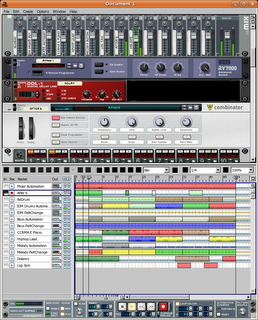The latest issue of the WINE Weekly Newsletter was released last week and has some interesting details about where WINE's headed.
For those not familiar with WINE, it's a software project that allows Micrsoft Windows applications to run under Linux (and other *NIX OSes). It's been in development for about 13 years now and is the result of a tremendous effort by many people. Over the past few years, WINE's compatibility has been improving at an impressive rate, and I consider it to be at that pivotal point where you can download a random Windows app from the internet and expect it to install and actually run (a far cry from the situation three years ago.) Watching a Windows application install significantly faster in Linux than it does in Windows is a sight to behold. :)
Propellerhead's Reason is an example of a complex Windows application that has only recently started working in WINE (thanks WINE team!)
Going back to the newsletter, check out these juicy tidbits about WINE 1.0:
As far as 1.0 goes, there's a lot of things that would be nice to have completed. The default registry needs a bit of help, the IDL compiler (widl) needs to be more feature complete, and Win64 would benefit from printf format fixes. Copy protection would be really nice to get in the tree and Ivan Leo Puoti reiterated that he had patches available. Alexandre responded that there are some critical parts of the design that need to be fleshed out because "the Wine maintainer is a pain in the ass." Finally, Alexandre called for more help with packaging. Most developers don't use the packages and they really could use more eyes with more testing done.
Despite that, a 1.0 release seems to be near (and yes, I should know better than to write such things.) The current plan is to continue working on Direct3D and get it stabilized. After that, a code freeze will begin and the plan is to have it last about 2 months. The target date for that is approximately the end of this year. Alexandre mentioned we have some projects going on right now that are rolling along nicely and it's probably worth letting those continue rather than lose momentum.
Post-1.0, a stable branch will be maintained and new development will eventually begin on a development branch. Using git will help a lot with this and fixes can be cherry-picked back in the stable branch. As far as version numbering goes, there's no clear plan for how it will work, although Jeremy White jokingly suggested "Wine 2007" for the release instead of 1.0.
There's also some stuff on WINE's Direct3D support:
Currently the rendering code is now shared between all versions of Direct3D from version 1 through version 9. There's been a huge improvement in shader code with shaders implemented with GLSL and the GL_ARB_*_program extensions. There's support for up to shader model 3.0.
But what would a Direct3D presentation be without some eye candy? Stefan showed off screenshots of some games. There was also a small contingent of DirectX folks in attendance with some really high-powered laptops that could show off the games. It's quite impressive to see the latest and greatest games running on Linux. Jon Parshall extensively, um, "tested" World of Warcraft throughout the conference (did you finally make it to level 48, Jon?) Tom Wickline had 3DMark2000, 3DMark2001SE and 3DMark2003 running all of there test. There is still some artifacts in the rendering of a couple of the test, but the DirectX guys knew what was to blame for it. Stefan showed off the Microsoft DirectX logo "proving" DirectX is being properly detected.
But perhaps the most interesting bit is this:
Direct3D10, which will ship with Windows Vista in a few months, doesn't seem to be a large cause for concern. At first glance it appears to be more of an evolutionary change rather than revolutionary. New shader support will be needed, but extending ours once OpenGL supports it should be pretty easy. Stefan mentioned Microsoft is currently offering a lot of incentives for Windows developers who develop D3D10-only games since they'll only be usable on Vista - there's no plan to backport D3D10 to XP. Dan Kegel asked if that means we should port Wine's forthcoming D3D10 implementation to Windows, which would be relatively easy when we switch to WGL.
(emphasis added)
That's just a really cool idea, and something that I think people'd appreciate.
If you're interested in other upcoming changes in WINE or would like a peek into the WINE developers' world, take a gander at the full issue here.




 Posted in:
Posted in: